Spartacus Blog
Rupert Murdoch appoints a new prime minister
The European Union referendum result came as a great shock to nearly all political commentators in the UK. It was in fact the greatest surprise in politics since the 1945 General Election when the man who was widely seen as the most important figure in the nation's victory, Winston Churchill, suffered a landslide defeat against a Labour Party, who went into the contest proclaiming it was a socialist movement.
In its manifesto, Let us Face the Future, it made it clear that "the Labour Party is a Socialist Party, and proud of it. Its ultimate purpose at home is the establishment of the Socialist Commonwealth of Great Britain - free, democratic, efficient, progressive, public-spirited, its material resources organized in the service of the British people.... Housing will be one of the greatest and one of the earliest tests of a Government's real determination to put the nation first. Labour's pledge is firm and direct - it will proceed with a housing programme with the maximum practical speed until every family in this island has a good standard of accommodation. That may well mean centralizing and pooling of building materials and components by the State, together with price control. If that is necessary to get the houses as it was necessary to get the guns and planes, Labour is ready." (1)
The Conservative Party and its friends in the media tried very hard to portray the Labour Party as a communist threat. In one radio broadcast by Churchill, Clement Attlee was compared to Adolf Hitler who, if elected would introduce some sort of Nazi system of government. "I must tell you that a socialist policy is abhorrent to British ideas on freedom. There is to be one State, to which all are to be obedient in every act of their lives. This State, once in power, will prescribe for everyone: where they are to work, what they are to work at, where they may go and what they may say, what views they are to hold, where their wives are to queue up for the State ration, and what education their children are to receive. A socialist state could not afford to suffer opposition - no socialist system can be established without a political police. They (the Labour government) would have to fall back on some form of Gestapo." (2)
This over-the-top scare campaign backfired and most Labour Party candidates later acknowledged that the broadcast won them votes. The same thing happened when George Osborne claimed that if the country voted to leave the EU he would have to slash public spending and increase taxes in an emergency Budget to tackle a £30bn black hole. The chancellor told us this could include raising income and inheritance taxes and cutting the NHS budget. (3)
However, the scare campaigns of Churchill and Osborne were not the main reasons that they lost both elections. The most important factor was the way the elections were reported in the press. In the 1945 General Election, the Labour Party received the support of three popular newspapers, Daily Herald, News Chronicle and The Daily Mirror. For the first and only time in history, the party enjoyed virtual parity of readership with the Tories in terms of national daily newspaper sales. (4)
During the war these newspapers published articles by socialist writers such as William Mellor, J. B. Priestley, G. D. H. Cole, H. G. Wells, Hannen Swaffer, Vernon Bartlett, Evelyn Sharp, Margaret Storm Jameson and Morgan Philips Price. It has been pointed out that throughout the war Michael Foot, used his "his Herald column... he argued that for the first time... the Labour Party... was about "to embark on the task of achieving socialism by full parliamentary and democratic means." (5)
The newspaper industry has traditionally played an important factor in elections. We all remember the headline, It's The Sun Wot Won It, after the 1992 General Election. (6) This followed a campaign against the Labour leader, Neil Kinnock, that culminated in the election day headline, "If Kinnock wins today will the last person to leave Britain please turn out the lights." (7)
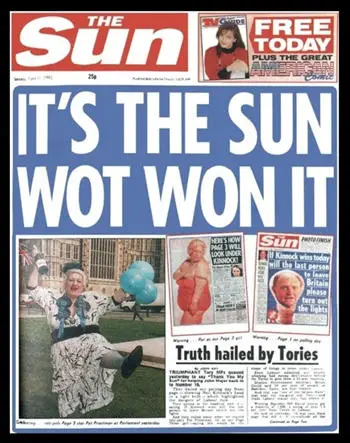
Kelvin MacKenzie, the editor of The Sun, had used the newspaper to support Margaret Thatcher since she became party leader in 1975. During the 1983 General Election MacKenzie ran a front page featuring an unflattering photograph of Michael Foot, then nearly 70 years old, alongside the headline "Do You Really Want This Old Fool To Run Britain?". A year later, the paper was staunch in its support for the re-election of Ronald Reagan as president in the USA; he was 74 years old. (8)
Tony Blair, a young Labour MP for Sedgefield, was one of those who believed that Rupert Murdoch had the power to select future prime ministers. When he became leader of the Labour Party in 1994 he appointed Alastair Campbell and Peter Mandelson, to his team with the instructions to get the support of Murdoch's media empire. The following year, Blair flew halfway round the world to address Murdoch and his News International executives on Hayman Island. (9)
It is not known what promises were made but on 18th March, 1997, The Sun told its readers to vote Labour. It explained that it was switching sides after more than 20 years of unswerving support for the Tory party. In a front page article headlined "The Sun Backs Blair", the newspaper, which has a daily readership of more than 10 million, stated Tony Blair should be the next prime minister. (10)
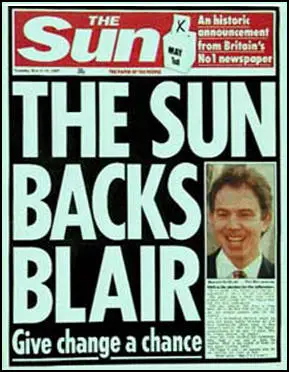
At the Leveson Inquiry Blair attempted to explain his relationship with Murdoch. He said he wanted to persuade the Murdoch media empire against "tearing us to pieces". Blair added: "If you look back over time there's nothing wrong and indeed it would, it would be strange frankly if senior people in the media and senior politicians didn't have that close interaction." He added that "I don't know a policy that we changed as a result of Rupert Murdoch." (11)
Lance Price, who became Blair's special advisor in 1998, remembers it slightly differently: "I have never met Mr Murdoch, but at times when I worked at Downing Street he seemed like the 24th member of the cabinet. His voice was rarely heard (but, then, the same could have been said of many of the other 23) but his presence was always felt. No big decision could ever be made inside No 10 without taking account of the likely reaction of three men - Gordon Brown, John Prescott and Rupert Murdoch. On all the really big decisions, anybody else could safely be ignored."
Price, who later became Blair's Director of Communications explained: "All discussions... with Rupert Murdoch and with Irwin Stelzer, his representative on earth, were handled at the very highest level. For the rest of us, the continued support of the News International titles was supposed to be self-evident proof of the value of this special relationship. The Sun and The Times, in particular, received innumerable 'scoops' and favours. In return, New Labour got very sympathetic coverage from newspapers that are bought and read by classic swing voters - on the face of it, too good a deal to pass up. In fact, New Labour gave away too much and received too little that it couldn't have expected to get anyway." (12)
One example of how the two men worked closely together was over the Iraq War. One analyst estimated that all 175 newspapers owned by Murdoch shared his enthusiasm for the invasion. Paul Dacre, the editor of The Daily Mail during the war told the Leveson Inquiry: "I’m not sure that the Blair government – or Tony Blair - would have been able to take the British people to war if it hadn’t been for the implacable support provided by the Murdoch papers. There’s no doubt that came from Mr Murdoch himself.” (13)
Alastair Campbell wrote in his diary on 11th March 2003, a week before the Commons debate in which MPs voted to deploy British troops to Iraq, that Murdoch intervened to try to persuade Blair to move more quickly towards war. "TB (Tony Blair) took a call from Murdoch who was pressing on timings, saying how News International would support us, etc... Both TB and I felt it was prompted by Washington, and another example of their over-crude diplomacy. Murdoch was pushing all the Republican buttons, how the longer we waited the harder it got." (14)
Of course, after Blair left office, Murdoch's media empire ceased supporting the Labour Party. In the 2010 General Election campaign Murdoch's newspapers supported the Conservative Party. On the day of the election The Sun produced an altered version of the anti-Kinnock headline featuring Labour prime minister Gordon Brown and the words "If Brown wins today will the last person to leave Britain please turn out the lights" next to an image of Brown's head in a lightbulb. (15)
The same thing happened in the 2015 General Election when the Murdoch empire targeted Ed Milliband. According to The Guardian: "One study found that the Sun, Murdoch's biggest-selling title, was more virulently anti-Labour in this campaign than it was in the run up to the 1992 election when Neil Kinnock was depicted in a lightbulb on polling day. What makes it more significant is that it comes in an era of declining newspaper sales and worries about their relevance in the digital age. It is likely that whoever replaces Milliband as Labour leader will be even more wary of threatening Murdoch or any other press baron with increased regulation and the breakup of their empires." Murdoch therefore can claim that his newspapers have supported every winning candidate since the election of Margaret Thatcher in 1979. (16)
Murdoch can also claim he won the EU Referendum, with most of his newspapers supporting a leave vote. Some commentators believe that The Sun article on 13th June, 2016, had an important impact on the electorate. It ran the headline "BeLEAVE in Britain" as its front page splash and accompanied it with a lengthy editorial saying that ending the 43-year relationship will "make Britain even greater". (17)
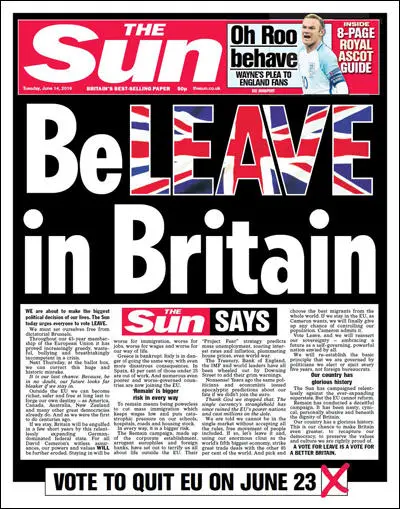
The referendum result was the culmination of a long campaign by Murdoch's newspapers. Anthony Hilton, who worked for Murdoch at the Sunday Times, has an interesting story to tell on this subject. "I once asked Rupert Murdoch why he was so opposed to the European Union". He replied: "'That’s easy. When I go into Downing Street they do what I say; when I go to Brussels they take no notice." (18)
However, it is doubtful if he could have won the EU referendum on his own. As he could not always guarantee a Conservative Party victory at general elections. In both cases he needed the support of other Tory newspapers. As Alastair Campbell pointed out: "The Mail, Sun, Express and Star in particular, and to a lesser extent the Telegraph and, on a bad day, the Times, are becoming propaganda sheets for one side of the argument. The Mail, whose evil (I use the word advisedly), cowardly and hypocritical editor, Paul Dacre, pockets vast EU grants on his vast Scottish estate, nonetheless allows barely a syllable in his paper that might reflect well on Europe. Rupert Murdoch has rediscovered his mojo and is now enjoying making sure every ounce of Sun ink is used to shape opinion in the direction he wants. Then the Barclays control the Telegraph from their Channel Island tax exile, and Richard Desmond’s Express papers feed a relentless diet of anti-EU front-page splashes as titillating and far-fetched as the stuff in the porn mags that helped create his fortune. By this bizarre collection of folk, or so they hope, public opinion is formed. (19)
As Campbell points out, the position of the anti-EU Paul Dacre is rather strange. The West Highland Free Press reported in 2014 that "Paul Dacre, has landed more than a quarter of a million pounds in EU subsidies for his sporting estate in Wester Ross. Mr Dacre has owned the 14,000-acre Langwell Estate near Ullapool since 2009 and it is heavily marketed to attract shooting and fishing parties. The lodge has recently undergone major renovation. According to the Farm Subsidy website which tracks EU payments, Langwell received EU grants to the value of 300,408 euros in 2012, 287,000 euros of which was paid under the European Agriculture Fund for Rural Development which is supposed to support 'diversification of the rural economy'. Another 13,000 euros was received in Direct Farm Payments." (20)
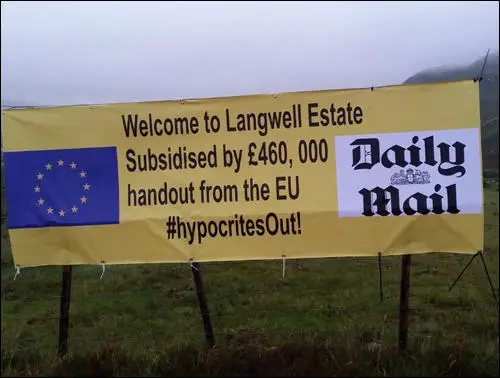
Richard Desmond, the owner of Express Newspapers, like Murdoch, is a long term opponent of the European Union, and has donated large sums of money over the years to the UK Independence Party. He also gave money to the Labour Party when Tony Blair was prime minister. It was his newspapers that first started the campaign to get out of the EU in November 2010. (21)
Desmond's newspapers campaigned heavily on issues such as immigration in the run-up to the 2015 General Election and was extremely hostile to Labour's pro-EU stance. However, as a businessman, he was not really a supporter of the UK leaving the EU. He told the Financial Times in 2015 that he thought it might hurt the British economy and was not sure how he would vote in the referendum. (22)
Jonathan Harmsworth, 4th Viscount Rothermere, the owner of DMG Media (Daily Mail, Mail on Sunday, Metro, etc.) also suffered from Britain's vote to leave the EU. His company's share price fall overnight from 647p to 587p. (23) However, after a few days normal service was resumed when the Daily Mail warned that "immigration could surge in the coming years as Europeans seek to enter the UK before Brexit takes effect." (24)
As Ian Burrell pointed out, the newspaper has a problem about reporting on Europe: "Its very essence is its sharply defined ideology. And the paper’s historic distrust of Europe dovetails conveniently with its dislike of the Prime Minister, who it subjects to relentless personal attacks. Stories that support the Remain campaign are reported in the Mail with disdain, accompanied by a campaigning 'Planet Fear' red stamp logo." (25)
The same is true of Sir David Rowat Barclay and Sir Frederick Hugh Barclay, the owners of The Telegraph Media Group, whose investments are valued at £6.5 billion. David's son, Aidan Barclay, who manages their UK businesses, was given the problem of dealing with this dilemma. According to Private Eye, Cameron tried offering the newspaper large amounts of government advertising in return for editorials in support of staying in the EU. (26)
Ten days before the vote, a survey of subscriber readers revealed that the vast majority of the people who buy the printed newspaper wanted to quit the EU. The magazine pointed out: "During the campaign they (the Barclay brothers) had received a series of pleading phone calls from Downing Street urging them to back Remain, and they were reluctant to snub the PM - not least for fear of missing out on their longed-for-gongs. But they were equally fearful of provoking a mass subscription cancellation... Nor did they want to fall out with their columnist Boris Johnson, who might soon have been PM (and in a position to do them favours)." (27)
The Sunday Telegraph (19th June) and The Daily Telegraph (21st June) finally came off the fence and advised its readers to vote to leave the EU. Like other newspaper proprietors, the Barclay brothers were convinced that when it came to the ballot, the British public would be too scared to vote leave. Dan Hodges wrote in the Mail on Sunday: "Whether they are prepared for it or not, Leave are certainly losing... If 43 years in the European Union hasn't turned the UK into a Eurosceptic nation, that shift is unlikely to occur in the next 26 days. The defining issue of British politics is no longer whether the Brexit camp can win, but how they choose to lose." (28)
The right-wing press were convinced that David Cameron would achieve a narrow victory but as his authority had been undermined he would have resigned and be replaced by either Boris Johnson or Michael Gove. However, the newspapers completely underestimated its influence over its readers. Everyday they were printing anti-EU stories. Even that might not have been enough but they had got used to voting as they were told in elections.
Polly Toynbee, the pro-EU Guardian journalist, as she has done for many years, completely misunderstood the mood of the British public: "On Friday I'll get my country back. Britain will vote Remain... I think I know this country isn't the Leave campaign's ingrown place of phobias, conspiracies, fear of foreigners and all the politics of paranoid isolation." (29)
People like Toynbee who campaigned for a EU remain vote like to portray their working-class opponents as racists and uneducated. However, as Tony Travers, an academic from the London School of Economics, has pointed out: "It is a response to 50 or 60 years of economic change from which some people have managed to gain, and others have found it harder, and in some cases a lot harder, to benefit from the new world." (30)
Cameron did not resign and the newspaper owners became worried about the dangers of a Johnson administration and encouraged Gove to betray him. Tory MPs reacted to this by refusing to nominate Gove for the leadership contest and instead it was Andrea Leadsom who was selected to face Theresa May.
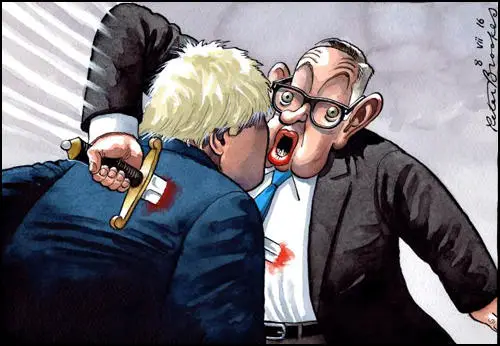
These Euro-sceptic MPs clearly had not been aware that several journalists were carrying out an investigation into her pre-parliamentary career since 2014. This mainly concerned her relationship with her brother-in-law Peter de Putron, who has sponsored her rise to fame. Embarrassingly, his name appeared in the files of wealth management company Kleinwort Benson that were obtained by the International Consortium of Investigative Journalists. (31)
Further investigation showed that Leadsom's brother-in-law, had donated £816,000 to her party via a company called Gloucester Research. "The group was critical of attempts by the EU to impose tighter regulations on hedge funds, and in a policy paper accused Brussels of being biased against London’s financial industry." (32)
Peter de Putron wrote out cheques to the Conservative party totalling £200,000 in 2010, £66,600 in 2011, £129,800 in 2012, and £204,760 in 2013. The details emerged following a leak of the identities of thousands of wealthy offshore clients who bank with a major Channel Isles private bank. In April 2014, she was appointed as Economic Secretary to the Treasury. (32)
Putron also donated a total of £680,000 to Open Europe, a think-tank which wants to see reform of the EU. This may have been responsible for Leadsom changing her mind about the EU. Speaking in 2013, she told the Hansard Society's Annual Parliamentary Affairs Lecture: "I'm going to nail my colours to the mast here: I don't think the UK should leave the EU. I think it would be a disaster for our economy and it would lead to a decade of economic and political uncertainty at a time when the tectonic plates of global success are moving. Economic success is the vital underpinning of every happy nation. The well-being we all crave goes hand in hand with economic success." (33)
As Private Eye has pointed out, Peter de Putron might have been keen to leave the EU for business reasons. "Leadsom has had plenty of financial backing from the offshore hedge fund run by her brother-in-law Peter de Putron, as has the EU-sceptic Open Europe thinktank she has championed... What result the Guernsey-based donor hopes for is not known. But plenty of other hedgies want out so they can escape EU regulation of their funds (inexplicably confident that a British Tory government would be kinder to them)." (34)
Andrea Leadsom campaign for the leadership did not last long and she resigned yesterday, stating that she did not have enough support for her cause, with only a quarter of the votes from the parliamentary party. It was two Murdoch owned newspapers that brought her down. On Saturday, The Times had reported an interview where she claimed that having children gave her an advantage over Theresa May. She was immediately criticized by senior Conservative politicians for her "vile" and "insulting" comments (35)
When it seemed that she could survive this mistake, the Sunday Times claimed that 20 Tory MPs would quit the party if Leadsom won the leadership contest. They quoted fellow Cabinet ministers as saying that she "was unsuitable for Downing Street". It is now believed that this story was completely made up and no Tories were threatening to resign. (36)
The next day Leadsom announced she was withdrawing from the leadership race. Once again Rupert Murdoch played a vital role in selecting the prime minister. This is not because he was so determined to have Theresa May but feared the consequences of allowing Conservative Party members to vote for Leadsom. Can you imagine the political crisis the Tory government would have faced if they were being led by Leadsom when the media began focusing on her relationship with her brother-in-law, Peter de Putron? (12th July, 2016)
References
(1) Let us Face the Future (May, 1945)
(2) Winston Churchill, radio broadcast (4th June, 1945)
(3) BBC News (15th June, 2016)
(4) Martin Pugh, Speak for Britain: A New History of the Labour Party (2011) page 274
(5) Simon Hoggart & David Leigh, Michael Foot: A Portrait (1981) page 94
(6) The Sun (11th April, 1992)
(7) The Sun (12th April, 1992)
(8) BBC News (8th March, 2001)
(9) The Independent (11th February, 1998)
(10) Roy Greenslade, The Guardian (18th March, 1997)
(11) BBC News (28th May, 2012)
(12) Lance Price, The Guardian (1st July, 2006)
(13) The Independent (8th July, 2016)
(14) Alastair Campbell, diary entry (11th March 2003)
(15) The Sun (6th May 2010)
(16) The Guardian (8th May, 2015)
(17) The Sun (13th June, 2016)
(18) Anthony Hilton, Evening Standard (25th February, 2016)
(19) Alastair Campbell, The Guardian (12th June, 2016)
(20) West Highland Free Press (24th January 2014)
(21) The Daily Express (23rd June, 2016)
(22) The Financial Times (12th June, 2015)
(23) The Press Gazette (27th June, 2016)
(24) The Daily Mail (27th June, 2016)
(25) Ian Burrell, The Independent (28th February, 2016)
(26) Private Eye (26th June - 7th July, 2016)
(27) Private Eye (8th July - 21st July, 2016)
(28) Dan Hodges, Mail on Sunday (29th May, 2016)
(29) Polly Toynbee, The Guardian (23rd June, 2016)
(30) Time Magazine (11th July, 2016)
(31) The Independent (9th July, 2014)
(32) The Guardian (6th July, 2016)
(32) The Daily Mail (9th July, 2014)
(33) Sky News (5th July, 2016)
(34) Private Eye (10th June - 23rd June, 2016)
(35) The Times (9th July, 2016)
(36) Sunday Times (10th July, 2016)
Previous Posts
Is it possible to be an objective history teacher? (18th May, 2016)
Women Levellers: The Campaign for Equality in the 1640s (12th May, 2016)
The Reichstag Fire was not a Nazi Conspiracy: Historians Interpreting the Past (12th April, 2016)
Why did Emmeline and Christabel Pankhurst join the Conservative Party? (23rd March, 2016)
Mikhail Koltsov and Boris Efimov - Political Idealism and Survival (3rd March, 2016)
Why the name Spartacus Educational? (23rd February, 2016)
Right-wing infiltration of the BBC (1st February, 2016)
Bert Trautmann, a committed Nazi who became a British hero (13th January, 2016)
Frank Foley, a Christian worth remembering at Christmas (24th December, 2015)
How did governments react to the Jewish Migration Crisis in December, 1938? (17th December, 2015)
Does going to war help the careers of politicians? (2nd December, 2015)
Art and Politics: The Work of John Heartfield (18th November, 2015)
The People we should be remembering on Remembrance Sunday (7th November, 2015)
Why Suffragette is a reactionary movie (21st October, 2015)
Volkswagen and Nazi Germany (1st October, 2015)
David Cameron's Trade Union Act and fascism in Europe (23rd September, 2015)
The problems of appearing in a BBC documentary (17th September, 2015)
Mary Tudor, the first Queen of England (12th September, 2015)
Jeremy Corbyn, the new Harold Wilson? (5th September, 2015)
Anne Boleyn in the history classroom (29th August, 2015)
Why the BBC and the Daily Mail ran a false story on anti-fascist campaigner, Cedric Belfrage (22nd August, 2015)
Women and Politics during the Reign of Henry VIII (14th July, 2015)
The Politics of Austerity (16th June, 2015)
Was Henry FitzRoy, the illegitimate son of Henry VIII, murdered? (31st May, 2015)
The long history of the Daily Mail campaigning against the interests of working people (7th May, 2015)
Nigel Farage would have been hung, drawn and quartered if he lived during the reign of Henry VIII (5th May, 2015)
Was social mobility greater under Henry VIII than it is under David Cameron? (29th April, 2015)
Why it is important to study the life and death of Margaret Cheyney in the history classroom (15th April, 2015)
Is Sir Thomas More one of the 10 worst Britons in History? (6th March, 2015)
Was Henry VIII as bad as Adolf Hitler and Joseph Stalin? (12th February, 2015)
The History of Freedom of Speech (13th January, 2015)
The Christmas Truce Football Game in 1914 (24th December, 2014)
The Anglocentric and Sexist misrepresentation of historical facts in The Imitation Game (2nd December, 2014)
The Secret Files of James Jesus Angleton (12th November, 2014)
Ben Bradlee and the Death of Mary Pinchot Meyer (29th October, 2014)
Yuri Nosenko and the Warren Report (15th October, 2014)
The KGB and Martin Luther King (2nd October, 2014)
The Death of Tomás Harris (24th September, 2014)
Simulations in the Classroom (1st September, 2014)
The KGB and the JFK Assassination (21st August, 2014)
West Ham United and the First World War (4th August, 2014)
The First World War and the War Propaganda Bureau (28th July, 2014)
Interpretations in History (8th July, 2014)
Alger Hiss was not framed by the FBI (17th June, 2014)
Google, Bing and Operation Mockingbird: Part 2 (14th June, 2014)
Google, Bing and Operation Mockingbird: The CIA and Search-Engine Results (10th June, 2014)
The Student as Teacher (7th June, 2014)
Is Wikipedia under the control of political extremists? (23rd May, 2014)
Why MI5 did not want you to know about Ernest Holloway Oldham (6th May, 2014)
The Strange Death of Lev Sedov (16th April, 2014)
Why we will never discover who killed John F. Kennedy (27th March, 2014)
The KGB planned to groom Michael Straight to become President of the United States (20th March, 2014)
The Allied Plot to Kill Lenin (7th March, 2014)
Was Rasputin murdered by MI6? (24th February 2014)
Winston Churchill and Chemical Weapons (11th February, 2014)
Pete Seeger and the Media (1st February 2014)
Should history teachers use Blackadder in the classroom? (15th January 2014)
Why did the intelligence services murder Dr. Stephen Ward? (8th January 2014)
Solomon Northup and 12 Years a Slave (4th January 2014)
The Angel of Auschwitz (6th December 2013)
The Death of John F. Kennedy (23rd November 2013)
Adolf Hitler and Women (22nd November 2013)
New Evidence in the Geli Raubal Case (10th November 2013)
Murder Cases in the Classroom (6th November 2013)
Major Truman Smith and the Funding of Adolf Hitler (4th November 2013)
Unity Mitford and Adolf Hitler (30th October 2013)
Claud Cockburn and his fight against Appeasement (26th October 2013)
The Strange Case of William Wiseman (21st October 2013)
Robert Vansittart's Spy Network (17th October 2013)
British Newspaper Reporting of Appeasement and Nazi Germany (14th October 2013)
Paul Dacre, The Daily Mail and Fascism (12th October 2013)
Wallis Simpson and Nazi Germany (11th October 2013)
The Activities of MI5 (9th October 2013)
The Right Club and the Second World War (6th October 2013)
What did Paul Dacre's father do in the war? (4th October 2013)
Ralph Miliband and Lord Rothermere (2nd October 2013)
